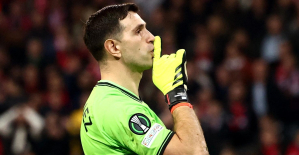After all. This Prime Minister's Conference (MPK) with the Federal Chancellor used this Tuesday. Stephan Weil (SPD), Prime Minister of Lower Saxony, was given a few minutes of television to the right of the Chancellor as the new chairman of this state committee. Five days before a foreseeable tight state election, which is about your own re-election, that's not a bad deal.
Beyond this small personal advantage, however, the round did not really make any progress this Tuesday with saving the economy and prosperity, which all 17 heads of government have volubly committed themselves to in this historic crisis. On the one hand, this was due to the fact that the most important building block of the planned state rescue measures, the “defence shield” announced by the traffic light coalition last year, already has a price tag – 200 billion euros – but no real structure yet. So far, no one knows who is to be helped with this money under what circumstances and to what extent – and who is not. The long-awaited proposal from an expert commission is expected for the weekend.
On the other hand, as quickly became clear in the press conference following the meeting of the heads of government, the federal and state governments simply still disagree about the exact modalities of financing their rescue efforts. Also about everything else that will actually be necessary to get through this historic economic crisis. Whether, after three relief packages and a "double boom", the planned defense shield, further measures may need to be financed. The federal states had put a whole list of necessities and possible additional burdens on the table for the federal government. The Federal Chancellor did not want to pay any attention to them in detail - at least not yet.
In the press conference that followed the four-hour meeting of the heads of government, Olaf Scholz preferred to limit himself to a few rough lines, listed facts that have been known for a long time and calculated that of the around 295 billion euros that the federal and state governments are currently planning for emergency aid, 240 to 250 billion would be financed from the federal treasury. "A decent number," as Scholz emphasized. Incidentally, it was his "confident summary of today's conversation" that the alliance between the federal and state governments was finally successful.
At least the Union-led countries are a long way from this assessment this evening. According to their spokesman, the Prime Minister of North Rhine-Westphalia, Hendrik Wüst (CDU), they have "only made a few steps forward and are far from having reached their goal". "Despite the constructive attitude of the federal states, the federal government has shown little willingness to compromise on very important issues". The Kiel Prime Minister Daniel Günther, the Hessian Prime Minister Boris Rhein and Friedrich Merz made similar statements. The CDU party leader spoke of an "evening of missed opportunities that leaves the citizens unsettled".
These formulations, which are very drastic for the “Prime Minister Conference” format, may also have a little to do with the upcoming election Sunday in Lower Saxony – the SPD and the Union could well be in a neck-and-neck race there. The Unionists' skepticism is therefore not unfounded.
In clear contrast to his colleague Wüst, SPD Prime Minister Weil spoke of a “big step” that was made on Tuesday. But Weil also conceded that no progress had been made either in financing the housing benefit, which the federal states believe should be the sole responsibility of the federal government in the future, or in the issue of local transport tickets, or in the costs of accommodating the refugees. Not to mention possible further costs for “economic aid and hardship regulations”, for hospitals and nursing homes, municipal energy suppliers, cultural events and sport, which the federal states would have liked to talk about.
So much, almost everything, remains vague after this meeting in the Chancellery. The next crisis meeting of the federal and state governments, which may be able to make a decision, should take place at the beginning of November at the latest. There is one advantage: state elections are no longer pending.

 Sydney: Assyrian bishop stabbed, conservative TikToker outspoken on Islam
Sydney: Assyrian bishop stabbed, conservative TikToker outspoken on Islam Torrential rains in Dubai: “The event is so intense that we cannot find analogues in our databases”
Torrential rains in Dubai: “The event is so intense that we cannot find analogues in our databases” Rishi Sunak wants a tobacco-free UK
Rishi Sunak wants a tobacco-free UK In Africa, the number of millionaires will boom over the next ten years
In Africa, the number of millionaires will boom over the next ten years WHO concerned about spread of H5N1 avian flu to new species, including humans
WHO concerned about spread of H5N1 avian flu to new species, including humans New generation mosquito nets prove much more effective against malaria
New generation mosquito nets prove much more effective against malaria Covid-19: everything you need to know about the new vaccination campaign which is starting
Covid-19: everything you need to know about the new vaccination campaign which is starting The best laptops of the moment boast artificial intelligence
The best laptops of the moment boast artificial intelligence Bitcoin halving: what will the planned reduction in emissions from the queen of cryptos change?
Bitcoin halving: what will the planned reduction in emissions from the queen of cryptos change? The Flink home shopping delivery platform will be liquidated in France
The Flink home shopping delivery platform will be liquidated in France Bercy threatens to veto the sale of Biogaran (Servier) to an Indian industrialist
Bercy threatens to veto the sale of Biogaran (Servier) to an Indian industrialist Switch or signaling breakdown, operating incident or catenaries... Do you speak the language of RATP and SNCF?
Switch or signaling breakdown, operating incident or catenaries... Do you speak the language of RATP and SNCF? The main facade of the old Copenhagen Stock Exchange collapsed, two days after the fire started
The main facade of the old Copenhagen Stock Exchange collapsed, two days after the fire started Alain Delon decorated by Ukraine for his support in the conflict against Russia
Alain Delon decorated by Ukraine for his support in the conflict against Russia Who’s Who launches the first edition of its literary prize
Who’s Who launches the first edition of its literary prize Sylvain Amic appointed to the Musée d’Orsay to replace Christophe Leribault
Sylvain Amic appointed to the Musée d’Orsay to replace Christophe Leribault Skoda Kodiaq 2024: a 'beast' plug-in hybrid SUV
Skoda Kodiaq 2024: a 'beast' plug-in hybrid SUV Tesla launches a new Model Y with 600 km of autonomy at a "more accessible price"
Tesla launches a new Model Y with 600 km of autonomy at a "more accessible price" The 10 best-selling cars in March 2024 in Spain: sales fall due to Easter
The 10 best-selling cars in March 2024 in Spain: sales fall due to Easter A private jet company buys more than 100 flying cars
A private jet company buys more than 100 flying cars This is how housing prices have changed in Spain in the last decade
This is how housing prices have changed in Spain in the last decade The home mortgage firm drops 10% in January and interest soars to 3.46%
The home mortgage firm drops 10% in January and interest soars to 3.46% The jewel of the Rocío de Nagüeles urbanization: a dream villa in Marbella
The jewel of the Rocío de Nagüeles urbanization: a dream villa in Marbella Rental prices grow by 7.3% in February: where does it go up and where does it go down?
Rental prices grow by 7.3% in February: where does it go up and where does it go down? With the promise of a “real burst of authority”, Gabriel Attal provokes the ire of the opposition
With the promise of a “real burst of authority”, Gabriel Attal provokes the ire of the opposition Europeans: the schedule of debates to follow between now and June 9
Europeans: the schedule of debates to follow between now and June 9 Europeans: “In France, there is a left and there is a right,” assures Bellamy
Europeans: “In France, there is a left and there is a right,” assures Bellamy During the night of the economy, the right points out the budgetary flaws of the macronie
During the night of the economy, the right points out the budgetary flaws of the macronie These French cities that will boycott the World Cup in Qatar
These French cities that will boycott the World Cup in Qatar Europa Conference League: the semi-final flies to Lille, which loses to the wire against Aston Villa
Europa Conference League: the semi-final flies to Lille, which loses to the wire against Aston Villa Lille-Aston Villa: Cash disgusts Lille, the arbitration too... The tops and the flops
Lille-Aston Villa: Cash disgusts Lille, the arbitration too... The tops and the flops Handball: Les Bleues in the same group as Spain at Euro 2024
Handball: Les Bleues in the same group as Spain at Euro 2024 Europa Conference League: for Létang, Martinez “does not have the attitude of a high-level athlete”
Europa Conference League: for Létang, Martinez “does not have the attitude of a high-level athlete”


















